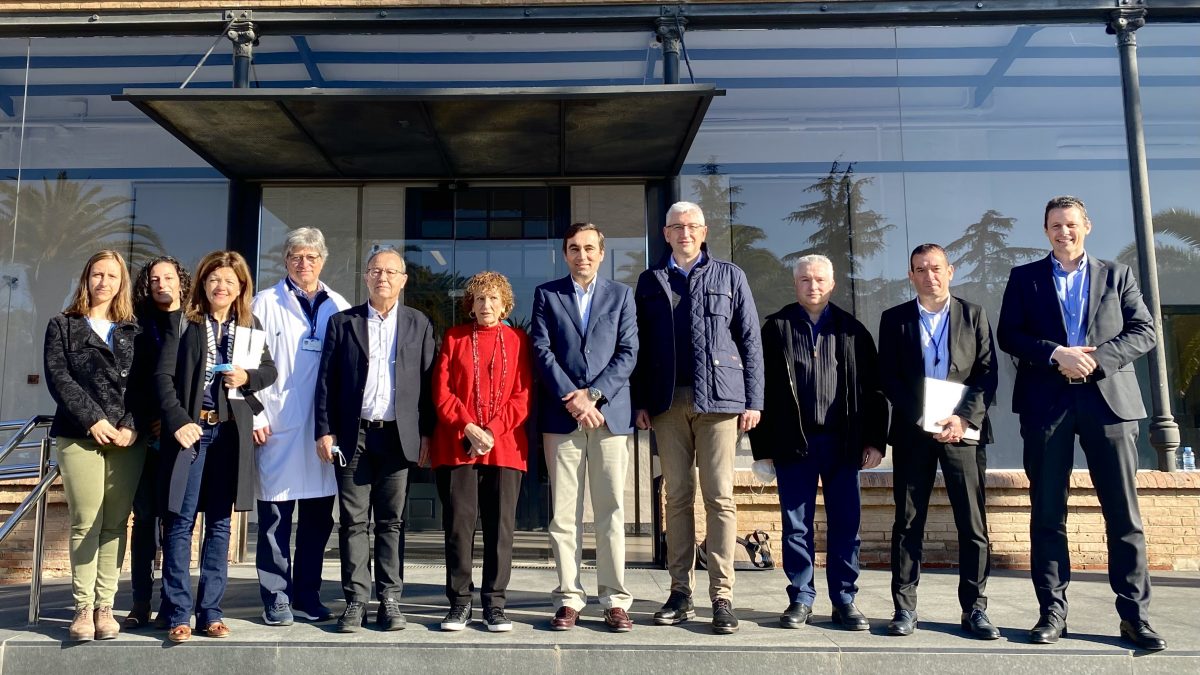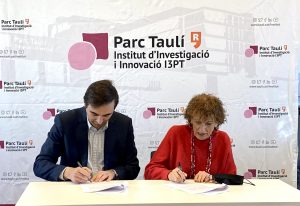
Parc Taulí and Aigües Sabadell will study the presence of antibiotic-resistant genes and bacteria in the city's wastewater
- Posted In:
- News
- Mireia Córcoles
- No Comments
- The initiative is part of the community health axis of the Biotop project, promoted by the City Council and the water company
La Fundació Institut d'Investigació i Innovació Parc Taulí (I3PT) and Aigües Sabadell have signed a collaboration agreement with the aim of carrying out a prevalence study to find out the presence of bacteria and antibiotic resistance genes in key points of the Sabadell sanitation network, as well as the city's two water treatment plants, managed by the water company. 
The agreement, signed this Friday by the president of the Parc Taulí Health Corporation, Marion Creus, and the president of Aigües Sabadell, Enrique Blasco, aims to identify possible sources of origin of this type of resistant bacteria to anticipate the emission of these into the environment, regulating the use and administration of antibiotics in the population. In addition, the study also seeks to advance removal strategies through purification to gradually reduce the presence of these genes and bacteria in the environment.
This research study, in which CETAQUA (Water Technology Center) and LABAQUA also participate, is part of the Biotop, specifically in the community health axis of the comprehensive project promoted by Sabadell City Council and Aigües Sabadell with the aim of promoting the ecological, digital and fair transition of the city, as well as promoting scientific research in the field of the integral water cycle.
El new research project is based on the experience of the City Sentinel, the surveillance system that made it possible to monitor the evolution of the SARS-CoV-19 virus in Sabadell's wastewater during the early stages of the Covid-2 pandemic and to anticipate the emergence of possible new ones. outbreaks in the population.
The problem of antibiotic-resistant bacteria
The growing threat that antibiotic-resistant bacteria and their genes pose to human health and the environment has been defined by several global institutions as one of the greatest challenges of this era.. The Global Plan of Action on Antibiotic Resistance proposed by the World Health Organization (WHO) aims to combat this problem in all areas related to human beings, where the environment is implicitly included.
Antibiotic-resistant bacteria and their genes reach wastewater through human and animal excretions and other waste related to economic activity. Countries such as Spain, Portugal, Ireland and Cyprus, due to their high use of antibiotics in medicine and livestock production, have high concentrations of these pollutants emerging in wastewater. Specifically, Wastewater Treatment Plants (WWTPs) that receive hospital or livestock wastewater show high concentrations of antibiotic-resistant genes and bacteria. Once in the sewer, bacteria and antibiotic resistance genes reach the WWTPs where it has been studied that the effectiveness of conventional treatments to reduce these pollutant values is less than 1 logarithm.
However, some studies show that it is difficult to achieve these reductions. In fact, they have been found in a wide proportion of European surface waters. So, Knowing the presence of these bacteria and their antibiotic resistance genes in wastewater and at key points in the sanitation network can help to better characterize the problem from two angles.: for the health part in anticipation of the transmission of these bacteria and genes to the environment regulating its use and administration and knowing the main resistances and foci of pollution, and for the environmental part, to know the presence of these bacteria and their genes of resistance in the station of sewage treatment plant (EDAR), allowing to establish bases to suggest recommendations on how to operate the purification processes to minimize the spread of these bacteria and their environmental resistance genes thus protecting biodiversity.
Following this agreement, a Scientific Committee will be set up with the Parc Taulí Research and Innovation Institute, Aigües Sabadell, CETAQUA and LABAQUA, who will coordinate the project. A plan for the sampling and analysis of wastewater in the Sabadell sanitation network will be developed and executed and the results will be analyzed and published on the City Sentinel visualization platform. Then, specific actions will be proposed, such as adapting the guidelines for empirical antibiotic treatment according to the prevalence of resistant microorganisms, as well as elimination strategies through purification.



Leave a Reply